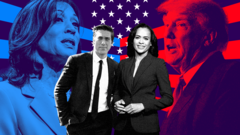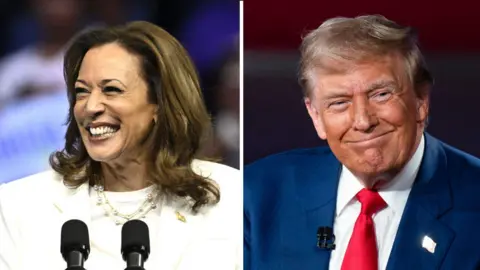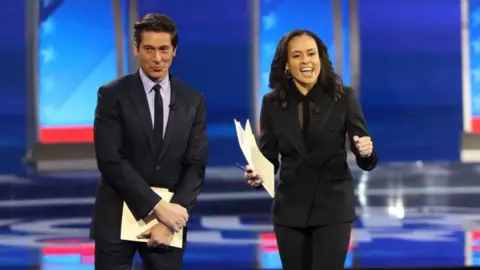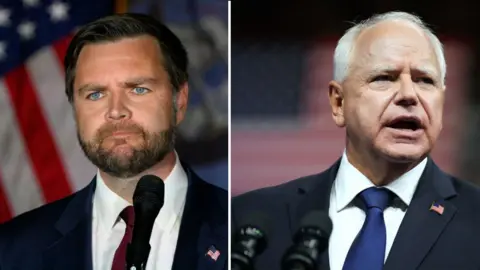This website uses cookies so that we can provide you with the best user experience possible. Cookie information is stored in your browser and performs functions such as recognising you when you return to our website and helping our team to understand which sections of the website you find most interesting and useful.

 Getty Images
Getty ImagesWith less than two months to go until Americans cast their ballots for president on election day, Donald Trump and Kamala Harris will confront each other in their first debate on Tuesday.
The Republican ex-president and the Democratic vice-president remain locked in a tight race, both nationally and in the swing states.
The primetime duel on ABC News will be their first meeting and only the second time they have shared the same room.
It is not the first debate of the campaign. Trump faced Joe Biden on stage in June, weeks before the president dropped out of the race.
When and where is the debate?
The debate begins at 21:00 EDT (02:00 BST) on Tuesday 10 September.
It takes place live on US network ABC from the National Constitution Center in Philadelphia, Pennsylvania.
The event will last 90 minutes with two commercial breaks, and there will be no audience in the room.
It will be streamed live on the BBC News channel. You will be able to watch on the BBC News website and app via our live page.
The BBC will have a team of reporters in Philadelphia and in Washington providing analysis, fact checks and reactions as part of our live coverage.
What are the rules?
ABC World News Tonight anchors David Muir and Linsey Davis will be the moderators.
They will not have to deal with two candidates interrupting each other because the mics will be muted when either of them is not speaking.
Those were the rules for the debate earlier this year between Trump and Mr Biden, following a disruptive 2020 debate between them.
Ms Harris was hoping to get the mics switched on throughout because the present format, her campaign said, "shields Donald Trump from direct exchanges with the vice-president".
 Getty Images
Getty ImagesTrump will get the last word at the debate and Ms Harris chose to appear on the right side of viewers' TV screens.
No topics or questions will be shared in advance with the candidates or their campaigns, and no props or pre-written notes will be allowed on stage.
Both candidates will only have a pen, notepad and water bottle, and cannot interact with campaign staff during commercial breaks.
Neither is permitted to step away from their lecterns - as Trump did against Hillary Clinton in 2016.
What is there to look out for?
As shown by the fallout from Mr Biden's stumbling debate performance that led to him ending his candidacy, presidential debates are high-stakes campaign milestones that can reshape the race.
It's a unique chance for candidates to make a good impression with voters as clips go viral and soundbites are replayed over and over.
This will be particularly important for Kamala Harris, who has largely stuck to scripted appearances in her campaign so far.
New polling by Siena College for the New York Times, published on Sunday, suggests many voters have yet to work out who she is and what she stands for.
The race between her and Trump remains extremely close, both nationally and in the swing states that will decide the outcome.
How are the candidates preparing?
Ms Harris is preparing by working with Washington lawyer Karen Dunn, according to the New York Times, which says Dunn has helped Democratic politicians plan for debates for nearly two decades.
Dunn, who often represents tech companies in court, operates with "tough love", 2016 Democratic nominee Hillary Clinton told the newspaper.
"She’s unafraid to say, ‘That’s not going to work’... But she also offers encouragement," Clinton said.
Philippe Reines, a former Clinton adviser who stood in for Trump during her mock debates, is reportedly reprising the role for Ms Harris.
Trump has taken a different approach that has partly focused on speaking to voters, his team says. One adviser told the BBC he was also working to hone the "theatrics" of his debate performance.
Notable advisers to the former president in the lead-up to this debate are Tulsi Gabbard, a former Democratic congresswoman who clashed with Ms Harris during the party's 2020 primary debates, and Florida Republican congressman Matt Gaetz.
Will there be any more debates?
 Getty Images
Getty ImagesOn 1 October, rival running mates JD Vance and Tim Walz will participate in a single vice-presidential debate on CBS News.
But the presidential campaigns have not agreed on the terms for any future showdowns between Trump and Ms Harris.
Trump has called for at least two more. He is pushing in particular for a showdown on more friendly turf - moderated by Fox News and with a large live audience.
The Harris campaign has said it will evaluate whether or not to do a second debate in October, once their first face-off has concluded.
The non-partisan Commission on Presidential Debates (CPD) that has overseen these events since 1988 has been sidelined in favour of the TV networks dealing directly with the campaigns.
The CPD, which intended to organise three debates in September and October, has blamed the Biden campaign for failing to abide by tradition.




 Africana55 Radio
Africana55 Radio 

